Most people do not enjoy the train ride back to New York City from a party-packed, summer weekend at Montauk, NY. I rarely shared in this common view.
Any train for me is a great space for focus. But the return trip from Montauk was always a specifically great time for me. It allowed me to return to my more scholastic self and actually move my neurons after a weekend of ‘apoptosis’ (“cell death”). 🙂
On one particular weekend in late July 2014, I had just boarded the NYC-bound train, and, right on cue, my typically talkative friend had fallen fast asleep into an audible pool of light music.
Excited, I proceeded to take out the July issue of the Atlantic magazine – one of my favorite publications.
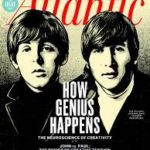 There was a particular article that had caught my attention. It was the cover story called the “Power of Two” written by the journalist, Joshua Wolf Shenk.
There was a particular article that had caught my attention. It was the cover story called the “Power of Two” written by the journalist, Joshua Wolf Shenk.
The cover depicts Lennon and McCartney, side-by-side. I anticipated a great Beatles history and what was so special about these two. But what I got was a much bigger idea.
The idea was that two specific people, together, both conscious and subconsciously, by way of differences and similarities, push and pull, being near and trusting each other, can create together, and individually, a greater whole.
They, in fact, become a “whole” of sorts. And through that, paradoxically, they become themselves.
By the end of the train ride, emotional and tear-welled, only one person came to my mind: my brother.
I thought instantly of my brother, Jordy.
When I got back to New York, I made sure to save the magazine (I still have it, 3 years later). I also purchased the book Shenk wrote about the same topic (referenced below).
I knew I would use it to write something to him – maybe my best-man speech at his wedding or something like that.
Welp – perhaps I will work it in later on – but today, on his 33rd birthday, I decided to, perhaps prematurely, “break out the fine china.”
—
Two of a Kind
“Sometimes you meet someone who could change your life. Sometimes you feel that possibility. The sense that, in the presence of this celestial body, you fall into a new orbit; that the ground beneath you is more like a trampoline; that you may be able—with this new person—to create things more beautiful and useful, more fantastic and more real, than you ever could before.”
This is how Shenk starts off his book. A fitting phrase for me and Jord.
Of course, Jordy and I didn’t just “meet” like that. I was lucky enough to be born into the family.
As far back as I can remember, we did everything together. Sports, eating, joking, video games, watching movies, riding bikes, going to summer camp.
And over time, we developed what became much more than a kinship. We had our own worlds; our own language. It was like we were in our own movie.
It would be very typical for us to depend on each other to remember little pieces of each other’s lives or of movies or experiences, and be able to summon them when the other beckoned.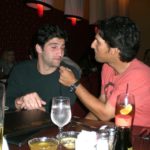
Malcolm Gladwell, in his book, The Tipping Point, taught us how collective conscious works. He explained what psychologists have known for decades – that two people, between them, can hold more information and the sum of the two separated.
There is a collective remembering. It is called “transactive memory.”
Gladwell uses it to describe how ideas flow quickly from one person to another:
“What that associate is talking about is the psychological preconditions for transactive memory: it’s knowing someone well enough to know what they know, and knowing them well enough so that you can trust them to know things in their specialty. It’s the re-creation, on an organization-wide level, of the kind of intimacy and trust that exists in a family.”
For Gladwell, this was about idea flow.
For me and Jordy, there was no goal. No intent.
Well, other than fun.
Many more times than either of us can probably recall (or maybe the other one can), we have put the other on the spot, referring to some obscure phrase in a Jim Carey movie, or a certain thing a relative use to say 25 years ago.
And with barely a hint, the other one draws it out of thin air.
It’s exhilarating every time. We congratulate each other and snicker. We wonder how it is that the other was able to remember.
But that’s easy – because we depend on one another.
—
Gibberish
We also have our own language.
When my brother and I talk, it is almost as if we have our own dialect. We speak in a jumble of movie quotes, inside jokes, voices, laughs, references, and rhetoric.
[In fact, I’ve planted many insiders here throughout – try to decipher at your own risk].To an outsider, this typically sounds like gibberish; something foreign.
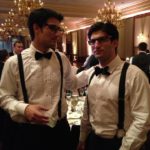 To us, it merely feels like home.
To us, it merely feels like home.
It’s as the two founders of Sony were described by kin:
“we had no idea what they were saying . . . It was gibberish to us, but they were understanding each other.”
Shenk explains this phenomenon in the book. Psychologists call it “tacit knowledge.”
“Widely understood as a key to human interaction—maybe even the DNA of interpersonal exchange—it depends on firsthand observation and interaction: sifting through the slowly accruing sediment of mutual experience.”
“In the peak years, two members of a pair don’t just speak similarly; they speak together.”
We are each other’s interpreters.
We will be in a group of people – even sometimes our friends. But we don’t change.
There is no face put on merely because others are there – even if they wear suits and have fancy titles or big bank accounts.
My brother and I continue to communicate – out loud and telepathically.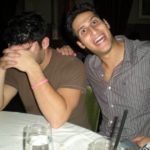
Someone will make a comment about some thing that they did or saw. If that thing is slightly off in some way – or at least in a way that we think humorous – instantly we will catch each other’s eye.
A quick smirk – hardly noticeable to others.
To us – we can notice nothing else.
This is a typical scene from our childhood:
“Baarrrrbbbbbb. Barrrrbbbbbbbbbbb.”
Jordy is calling my mother, Barbara’s, nickname in a low, bellowing, baritone. But he doesn’t actually want to speak to her. He is merely doing it for our amusement; and for her annoyance.
Jordy is standing by the front door, waiting for me to come down. We are going to go out in the front yard and he is going to hit low, line-driven tennis balls at me, with his 9 iron, and I will try to catch them. I will try really hard.
I am almost ready. Jordy’s voice sounds again:
“Mall’s on fire. Malls on fire.”
This time, the voice takes the sound of that of an aging Long Island man, of Jewish descent, and sarcastic bent. He is quoting an obscure line delivered by Rodney Dangerfield in the movie Ladybugs. I start laughing, hardily.
Finally, I am able to get downstairs, I am ready to go.
And so, we go.
—
Yin and Yang.
But it isn’t all about cohesion.
Great pairs, Shenk tells us, are formed just as much on the basis of their individual preferences and peculiarities, as they are their sameness.
“Like most great pairs, they were an archetypal odd couple. And yet in some ways it was as though they were twins separated at birth,” Shenk writes of David Crosby and Graham Nash of Crosby, Stills, and Nash.
Of Steve Jobs and Wozniak:
“Yet, while they shared a distinct vision, their temperaments and characters diverged sharply.”
It is this tension, the “yin and yang’ effect, the seems to be key to a truly creative and distinct pair.
That’s me and my brother.
Jordy taller, tanner, more fluid, perhaps more publicly anxious, sensitive, artistic, athletic, wayyy funnier. Me, more calculated and planned, shorter, stockier (usually), rougher, more robotic in gate and movement, bitten nails, leaps-and-bounds better facial hair!
But then sometimes, it seems as if we alternate roles and characteristics.
In his book, The Gift, Lewis Hyde, analyzing the work of Walt Whitman, extracts a point about the artist, in Whitman’s view.
Whitman asserts that the artist needs two elements to be able to deliver his gifts to the word. One part sympathy and the other the will.
Here, the sympathy means the heart. The emotion and connection – connection to others, to yourself, to nature. This is the imagination, the wild and free spirit, the originality, the care for the world to which you intend to give.
The will, on the other hand, is the driving force, the self, the habit, the desire to make your voice heard. It is the shape and the tact.
Whitman describes each of these, similar to how the Beatles long-time producer, George Martin, describes John and Paul (via Atlantic journalist, Joshua Wolf Shenk): “Imagine two people pulling on a rope, smiling at each other and pulling all the time with all their might,” he said. “The tension between the two of them made for the bond.”
This is how the will and sympathy interact to create the whole. And so it was and is for my me and Jordy. Each taking turns pulling. Swapping roles between the will and sympathy.
—
Competitors
In Roland Lazenby’s book Michael Jordan, The Life, he describes Michael Jordan crediting much of his athletic development, and, more importantly, his competitive spirit, to his older brother, Larry.
“Still, the main event every day became Michael versus Larry in titanic games of one-on-one…Day after day after day, they went at each other, with Larry able to use his strength to dominate his younger brother.”
And quoting the late Jordan father, James:
“I think Michael got so good because Larry used to beat him all the time,” James Jordan would explain later. “He took it hard.”
This happened in our family as well.
Except here, as his bar mitzvah theme and name would attest, Air Jordan was the older brother. And the beatings basically never ended.
I don’t think I ever beat Jordy in anything for at least the first 20-25 years of my life. And, that includes Madden and NBA Live on Sega Genesis.
[“Way to go boo-boo.” “Reeeegal Beeeeeagle.”]But unlike the Jordan brothers, who, Lazenby tells us, often would result to all-out fighting, Jordy and I were always trying to get each other better.
 Our competition was not the type that was of the principal purpose of winning.
Our competition was not the type that was of the principal purpose of winning.
No.
The principal purpose was to elevate the pair. It was so we both got better. I don’t repel competition from my brother, nor look at it as an opportunity to exceed him.
I look at it as an opportunity for both of us to exceed ourselves.
This type of competition is best explained by NYU professor, James Carse.
“The critical distinction, as developed by the philosopher James Carse, is between the finite game and the infinite game. “A finite game is played for the purpose of winning,” Carse wrote, “an infinite game for the purpose of continuing the play.”
Shenk clarifies:
“Where finite games hinge on competition, infinite games operate at the intersection of competition and cooperation.”
That is our type of competition and it is one of the many things for which I am indebted to my brother.
—
Scenes from a Jewish Restaurant (slash our house)
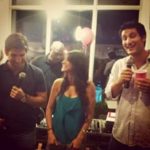 We did a lot of weird things with food.
We did a lot of weird things with food.
On Sundays, when we’d order Chinese (duh, Jews), we’d each get chicken fried rice. “On your marks, get set, go,” Jordy’d say and then the two of us would pour the contents of our cartons on to a plate, and proceed to race to the finish. I’d typically get sick. He would usually start choking (he still does this – the choking part).
At night, if we had grapes, we would trade off throwing them in the air, across the kitchen to one another. The other, of course, had to catch it in his mouth. If there was any error at all, it was usually on the part of the thrower.
If we had ice cream, we would take huge scoops, hold the spoon up really high. The other would squat under it, really close to the ground, and catch the ice cream in his mouth. Mmmm-mmm. Delish.
[You can see how both of us got chunky in middle school / early high school.]In the mornings, in Florida, when our grandpa would make us cereal, Jordy and I would watch him cut up strawberries. He would then give us our bowls. Jordy, got a huge piece of Tupperware. I would normally go with the standard bowl. We both loved those times, I think.
Whenever I made cereal, and I was about to take my first bite, Jordy would usually come in and take a HUGE bite. I would get really mad. I hated that.
But looking back on it, I really didn’t. In truth, I would always rather him swoop in and take a bite than not be there.
Whenever he was there food was better.
It still is.
—
“Jordan you are my Hero, and I believe you can Fly”
The scene: Jordy’s bar mitzvah. The year is 1996.
On the screen, a slideshow of pictures is voiced-over by my mom. “Jordan, you are my hero, and I believe you can fly.” I got chills. Boom – fade right into Bette Midler and R. Kelly.
What follows are a montage of our childhood memories and the many different shades of Jordy.
I am picturing that right now.
Jordy showed me how to play sports and he protected me at sleep-away camp.
He got me drunk for my first time. I didn’t want to go out, so we ordered Chinese to his freshman year dorm and watched Rocky IV. I think I had about 4 beers. I could barely make it down the hall to the bathroom.
He always let me hang out with his friends. He always checked on me to see how I was doing. He still does.
The artist, the comedian, the empathetic brother and son, the athlete, the master.
He makes me laugh, he makes me think and he makes me try harder. He inspires, he listens, he helps and he cares.
And he really is an amazing talent.
Athletically, hard to match.
He was on all the good teams, had a bit of size, a great understanding for positioning, movement and spacing, and his hand-eye coordination was something of a marvel. He played the “hot corner” in baseball with apparent ease.
He barely ever missed an outside shot, batted an insanely high average, was typically among the best players in each league. Everything was so fluid.
In high school, he helped the golf team win the county championship. He also was the youngest player ever to win our club championship.
He also pitched a perfect game – an UNHEARD of feat. [Read this to get an idea of how rare that is.]
But even with all of these sports accolades, that is not what impressed me most. It was and is his work ethic. His ability to rise to the top of any given field when he sets that as his goal. In short, his ability to seek and wrangle in “mastery.”
—
Back To The Train – Message to Jordy
While on that train in Summer 2014, I read one quote that took me over the edge emotionally.
It was something that the Dutch painter, Vincent Van Gogh wrote to his younger brother, Theo. At the time, Theo was worried about his little brother given his apparent lack of direction [read more about it here].
Vincent assured his brother that he was onto something. That it was coming. And that all of the guidance and help and support and love that Theo had given to him, was directly responsible. In a letter to Theo, Vincent said:
“My pictures are not yet good enough to compensate for the advantages I have enjoyed through you. But believe me, if one day they should be good enough, you will have been as much their creator as I, because the two of us are making them together.”
I read this quote and I thought of Jordy.
But not how you might think. I fantasized most of being Theo in this scenario. It is what I would hope to be. My best self.
But I sort of hope, as we have done our entire lives, we would each play each role.
Jordy,
You have served so many roles for me and I hope that I have served them for you.
You have been my ‘healthy competition’, my mentor, my coach, my empathizer, my audience, my cheerleader.
No matter what year of my life, you have served as the all of the above, all at once. You are the wall and the way, the hammer and the sponge, the leader and the listener, the confidence-giver and the inspirer, the superhero and the vulnerable.
For all of these things, I am in debt. But it isn’t a debt that drags, but one that lifts. We are constantly paying each other – not back – but forward. Higher and freer.
I believe you can do anything.
Whether or not you realize it, you wield tremendous power. History has proved, that you merely need to set your mind to something, and you steadfastly rise to the top.
You wanted to get a 4.0, you did it.
You wanted to become a scratch golfer, you did it.
You wanted to be the number one salesman, you did it.
I cannot wait to see what you decide to do next.
My guess is – you’ll do it.
And, until then, I’ll wait for your pictures to be good enough. I know they are in the works. I can feel it. And, on some level, I think you can to.
And I know that if I ever paint a great picture – it will almost wholly be because of you.
Happy 33rd.
Justin



8 Comments on “The Power of Two: My Brother and Me”
Words cannot express how meaningful and heartfelt that was, Justin. Of course, tears streamed down my face. Wow!! What an expression of love! Again, I am so proud of you. And of your brother and best friend, Jordy
Love you both
Mom
Tears?! You!? No!!! Haha. Thanks, Mom. We owe it to the Momzy!
JP
Thanks, Justy, Pusty, Gusty, Wusty
Pust, great piece! I am honored to make it to an article in your blog. We definitely have a special connection and I am grateful that you are my brother. Thanks for the kind words. You have already painted plenty of great pictures that I can’t take any credit for. Keep up the great work! Love you.
Thanks, Jord. I’ll keep at it. And I know you will too.
Wow. It’s 6am in the mng and I’m reading your blog for the 3rd time. Amazing and heart warming all at the same time. Always new you guys were special. Now I know why. 2 make the sum of 1. Always treasure each other. With much love and admiration. Jay Weinberg.
Incredibly nice comments, Jay. I really take them to hear – especially from you. We definitely will. Thanks for reading. See ya soon. Justin
Loved the material. I am a big fan of all The Steinfelders.